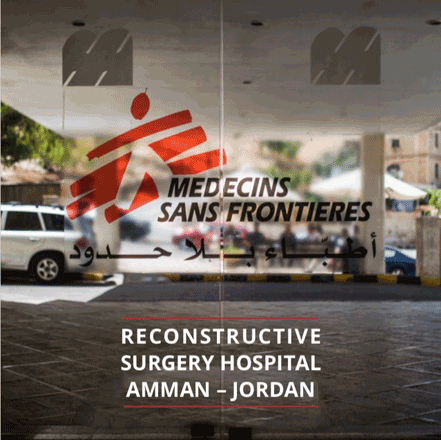You are here
Doctors Without Borders centres mental health in treatment
By Mays Ibrahim Mustafa - Mar 04,2023 - Last updated at Mar 04,2023

AMMAN — The medical assistance provided by Doctors Without Borders (MSF) is guided by the belief that “there’s no health without mental health”, according to a specialist at the organisation.
In a recent interview with The Jordan Times, MSF Mental Health Activity Manager at the Reconstructive Surgery Programme in Jordan, Da’ed Almnezil, noted that treatment only begins after ensuring patients’ preparedness and psychological wellbeing.
Twenty-one-year-old Yasmeen from Yemen, who sustained a burn injury, shared the details of her ongoing treatment journey with MSF, which began in 2018.
“I was in a really bad psychological state. I didn’t leave the house or even my room. I couldn’t bring myself to face people,” Yasmeen told The Jordan Times.
“I was angry at everyone for what happened to me. Whenever I saw my sisters in good health, I felt frustrated and resentful,” she said.
Yasmeen noted that MSF’s focus on mental health and psychological well-being made the treatment process “much easier”.
“The help I received restored my hope in life and in myself,” she said.
“When I received the phone call informing me that my file had been accepted [by MSF], I couldn’t speak and fell into tears. Every time I remember that phone call, my eyes overflow with tears of joy,” she continued.
Almnezil noted that MSF aims to deliver “integrated healthcare services”.
“Our psychological department is always involved in the treatment journeys of patients who sustained traumatic injuries,” she said.
The mental health expert pointed out that such experiences can take a toll on people’s mental wellbeing, leading some to develop negative body image, damaging their self esteem.
“Suffering traumatic injuries can even cause patients to harbour feelings of resentment towards people who are in good health, impacting their relationships with their friends and families,” she said.
MSF helps patients find a way to adapt to their injuries and move past them; “we help them focus on their abilities more than their disabilities”, she said.
The organisation’s reconstructive surgery hospital in Amman receives patients from Syria, Iraq, Yemen and Gaza through a monthly programme, according to Almnezil.
Any patient who arrives at the hospital must undergo a psychological evaluation using “standardised tools”, she said, noting that MSF’s staff takes into consideration that some patients might not be ready to talk about their mental health.
MSF also implements a peer support, or peer counselling, programme, through which individuals who underwent a successful recovery journey help patients with an injury that is similar to theirs, Almnezil added.
“This is likely to provide patients with a much needed emotional support, allowing them to relate to someone else’s experiences and feel understood. It also promotes independence, self-acceptance and more successful reintegration into society,” she said.
Almnezil also stressed that this programme contributes to enhancing patients’ quality of life, as some of them stay at the hospital for extended periods of time, sometimes exceeding a year.
Additionally, there is a school on hospital grounds that provides children with informal educational services until they complete their treatment journey and return to their home countries, she said.
Related Articles
AMMAN — Doctors Without Borders (MSF) on Thursday launched the Arabic version of the book “Reconstructing Lives: Victims of war in the Middl
AMMAN — A total of 81 photos taken by Magnum award-winning photographer Moises Saman are exposing the audience to mental health symptoms Pal
AMMAN — At least 59 war-wounded Syrians, including 11 children between the ages of 3 and 14, “have been denied medical evacuation into Jorda


















